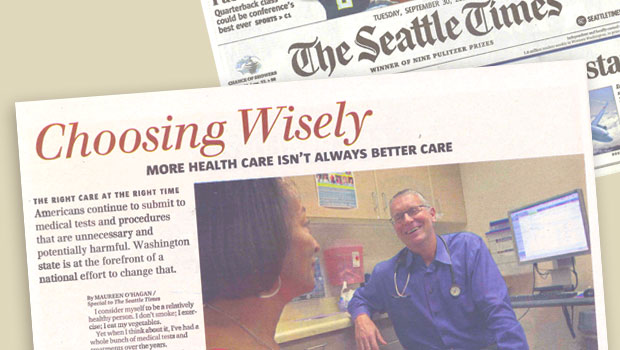Our top 10: Group Health studies that made the most news in 2014

Here’s our list of top 10 research stories of 2014—plus links to the news reports they inspired.
Group Health research often makes big news in high-impact media locally and nationally—and in social media—spreading findings that help to improve health and health care. Counting down based on the volume and impact of media coverage, here are the top-ten Group Health research stories for 2014—linking to some of the news reports they inspired
10: Living healthy
Thinking about your New Year’s resolutions? Us too. All year. Eric B. Larson, MD, MPH, and Paula Lozano, MD, MPH, appeared in a half-hour KIRO 7 TV special, Health Evolution, on how people can lead healthier lives. (Click to see the whole special). KUOW interviewed Dr. Lozano in an investigative story about a trend threatening children’s physical activity and weight: Recess Shrinks at Seattle schools: Poor Schools Fare Worst. A Seattle Times op-ed highlighted her contributions to that story. [And we launched the Live Healthy section of the Group Health Research Institute (GHRI) website this year.]
9: Improving breast cancer screening
A syndicated HealthDay story focused on Breast Cancer Surveillance Consortium (BCSC) research suggesting that having radiologists do diagnostic workups of some of their own recalled cases can help improve mammography’s accuracy. And TIME magazine and Puget Sound Business Journal covered another BCSC study, which showed that adding tomosynthesis to biennial digital mammography screening for women with dense breasts may improve breast cancer detection at a reasonable cost.
8: Improving colon cancer screening
The NPR Health blog reported on research by Beverly Green, MD, MPH, showing that colon cancer screening rates rose by nearly 40 percent when free stool tests were mailed to patients’ homes. People living in poverty are less likely to be screened for colorectal cancer—and more likely to develop the disease and die from it. A syndicated Reuters story covered another study involving Dr. Green, which showed that mailing a stool test promises to help end these disparities.
7: Preventing opioid abuse and overdose
Michael Von Korff, ScD, was prominently featured in an Al Jazeera America documentary about long-term prescribing of opioid drugs for chronic noncancer pain: Opioid Wars. He was also quoted in two widely syndicated USA Today stories: Millions with Disabilities Get Heavy-Duty Painkillers in Potentially Fatal Doses; and Seniors’ Use of Potent Meds via Medicare Staggering.
6: Weighing pros and cons of bariatric surgery
In syndicated Reuters and HealthDay stories, David Arterburn, MD, MPH, described an HMO Research Network study on tradeoffs between bypass and banding bariatric surgery. Reuters also interviewed him after he wrote bariatric surgery reviews in The BMJ, JAMA, and JAMA Surgery: Better Diabetes Remission after Weight Loss Surgery than Other Methods.
5: Engaging patients with coordinated team-based care
The Wall Street Journal lauded Group Health research on the Chronic Care Model (CCM) and TEAMcare in The Doctor’s Team Will See You Now—and interviewed Ed Wagner, MD, MPH, about the CCM in another article: Patients Can Do More to Control Chronic Conditions. National Institutes of Health Director Frances Collins, MD, PhD, devoted one of his blogs to collaborative care helping depression in teens at Group Health.
4: Engaging patients as co-investigators in research
The Wall Street Journal interviewed Karen Wernli, PhD, about engaging patients to help design research projects: Design Power: Patients Play Researchers in Drug Trials.
3: Using new medications for problem drinking
Katharine Bradley, MD, MPH, was widely interviewed about effective medications for alcohol use disorders that shouldn’t be such well-kept secrets. This coverage included the New York Times, NPR, HealthDay, and Bloomberg (syndicated in outlets including the Daily Herald and Washington Post). Naltrexone, acamprosate, and topiramate don’t make people feel deathly ill if they drink—unlike better-known but ineffective disulfiram (Antabuse).
2: Staying a step ahead of the flu
Group Health has the go-to flu experts for local and national reporters. Michael L. Jackson, PhD, MPH, appeared on a KING5 show where anchor Jean Enersen got her shot. Seattle Times and Reuters stories also quoted him. The New York Times and Washington Post quoted Lisa Jackson, MD, MPH, about options for vaccine protection.
1: Reducing care that doesn’t improve health
In the cover story of the Seattle Times’ Get Healthy section, Diana Buist, PhD, MPH, and Matt Handley, MD, discussed Group Health’s Choosing Wisely initiative: Over-prescribed: More Health Care Isn’t Always Better. KUOW aired a similar story: How Much Medical Testing Is Too Much? And a widely syndicated Washington Post story interviewed Daniel Cherkin, PhD, about avoiding overtreatment for back pain: Going to Doctor for Back Pain Can Be a Slippery Slope.
Here’s to another high-impact year for Group Health research in the media in 2015!


